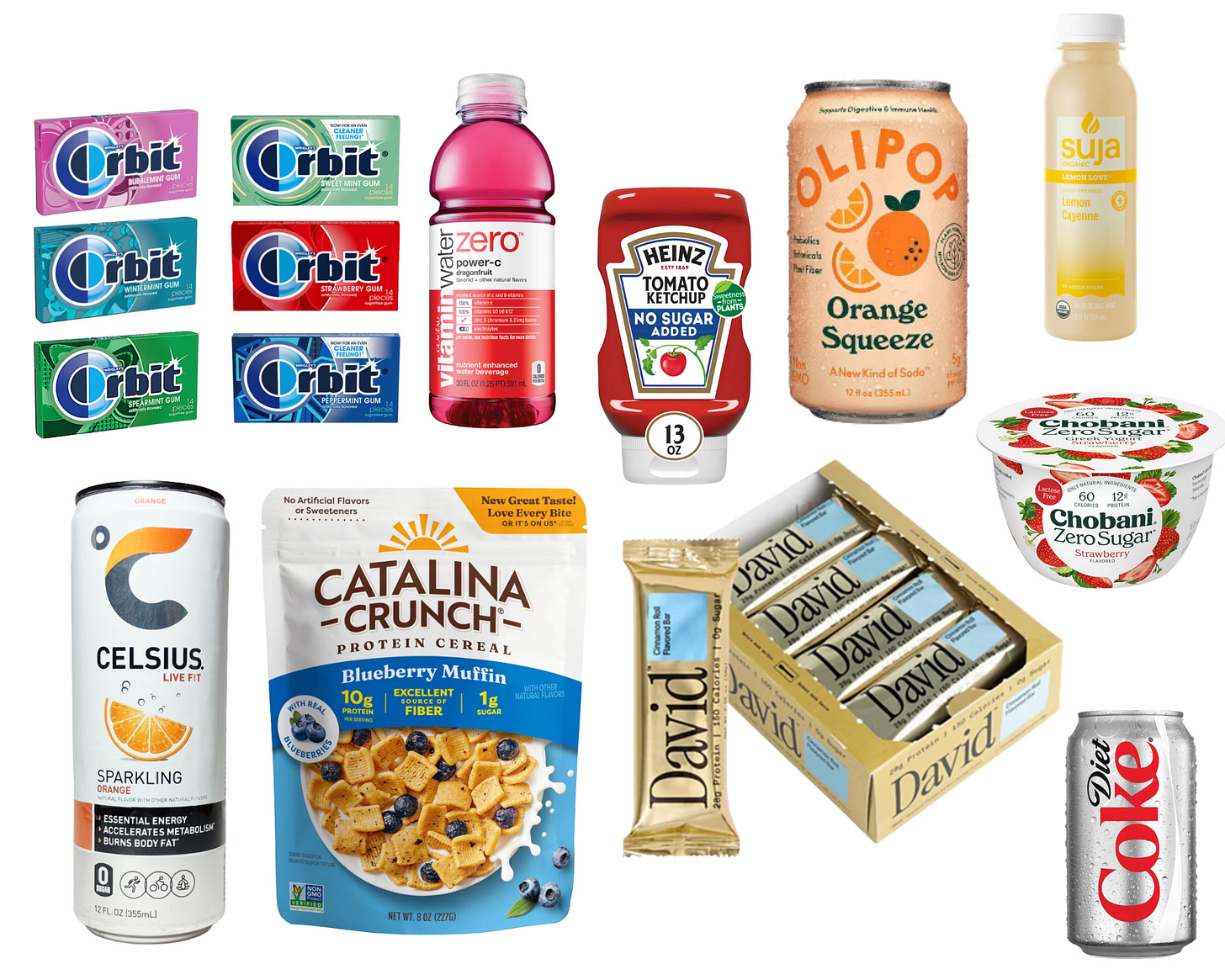What’s Really in David Bars? A Deep Dive into Sugar Substitutes
Everything you need to know about what they do in your body; and which ones might be worth avoiding!
We've been told for decades that sugar is the problem. It contributes to weight gain, insulin resistance, liver dysfunction, cardiovascular disease, and inflammation. High sugar intake has also been associated with cognitive decline and certain cancers.
In my practice, added sugars (and sometimes even naturally occurring ones) are often the first things my clients say they’re trying to avoid.
So it makes sense that replacing sugar with low- or zero-calorie alternatives feels like a logical step. These sweeteners offer the taste of sweet without the calories, the insulin spike, or the long-term health risks. Or at least this is what most of us believe…
But like most nutrition science, the answer isn't that black and white. Some sweeteners seem harmless in controlled trials, while others have been shown to have undesirable side-effects.
Beyond the ongoing debate around artificial sweeteners, what really pushed me to write this was reading about David Protein Bars this morning. Created by the makers of RX Bars, David Bars are ultra-processed, high-protein snacks that are quickly gaining popularity. Each bar contains not one, but four different sugar substitutes: allulose, maltitol, sucralose, and acesulfame potassium. Read on for a breakdown of what that actually means (and what it might mean for your body).
How are sugar substitutes different from sugar?
Sweeteners work by triggering the same receptors on your tongue that detect sugar, which is what gives them that familiar sweet taste. Some are 200 to 1,000 times sweeter than regular sugar, so only a tiny amount is needed to get the same level of sweetness.
If you’ve ever put just one Splenda in your iced coffee, you know it’s a very particular kind of intense sweet.
However, most sugar substitutes are not metabolized like sugar. Some pass through the body unabsorbed. Others are absorbed but excreted without providing energy. A few are metabolized, but in small enough amounts that their caloric contribution is minimal.
Is weight loss easier with sugar substitutes?
Short-term randomized controlled trials suggest sugar substitutes can help reduce body weight, especially when they replace caloric sweeteners. But the studies are often small, short in duration, and done under controlled conditions. We live in the REAL world with uncontrolled (or sometimes out of control- lol) conditions.
Interestingly, large observational studies show the opposite trend: higher intake of artificial sweeteners is associated with weight gain, not loss. Some animal research supports this too, suggesting artificial sweeteners may disrupt appetite regulation or energy expenditure, even when calorie intake is the same (!!).
Do sugar substitutes help with blood sugar control?
When artificial sweeteners replace sugar in foods or beverages, glycemic responses (aka blood sugar response) often improve. Put in other words, post-meal blood sugar and insulin levels are lower compared to sugar-sweetened alternatives.
But when artificial sweeteners are added to an already low-sugar or sugar-free diet, they may actually impair glucose tolerance over time. This likely has to do with how sweeteners affect the gut microbiome, how the body senses food after we eat it, and how it prepares for digestion, even before nutrients are absorbed.
This is unfortunate news for my Suja lemonade addiction.
The impact of sugar substitutes on the microbiome
Some of the most compelling (and concerning) evidence comes from microbiome studies. In both mice and humans, sweeteners like saccharin, sucralose, and aspartame have been shown to alter the gut microbiome in ways that promote glucose intolerance —> POOR blood sugar control. These changes can occur within days and appear to be linked to metabolic disruption.
Erythritol, stevia, and allulose show fewer negative microbiome effects, although long-term data are limited.
Why diet soda is less satisfying than its real sugar-containing counterpart
Sweetness on the tongue does not equal satisfaction in the brain. Artificial sweeteners don’t activate the same “I’m full” signals in the body that real sugar does.
They also don’t trigger a sensor in the gut that helps release hormones involved in appetite and fullness, like GLP-1 and PYY. These hormones are released by the gut after eating. They help regulate appetite, slow stomach emptying, and signal fullness to the brain. GLP-1 is also involved in blood sugar control, which is why it's the target of medications like Ozempic and Wegovy.
That means we may keep eating, chasing a sense of satisfaction that never comes. Over time, this can contribute to overconsumption and disrupted appetite regulation.
The low-down on some common sweeteners:
Keep reading with a 7-day free trial
Subscribe to Dietitian's Edit to keep reading this post and get 7 days of free access to the full post archives.


